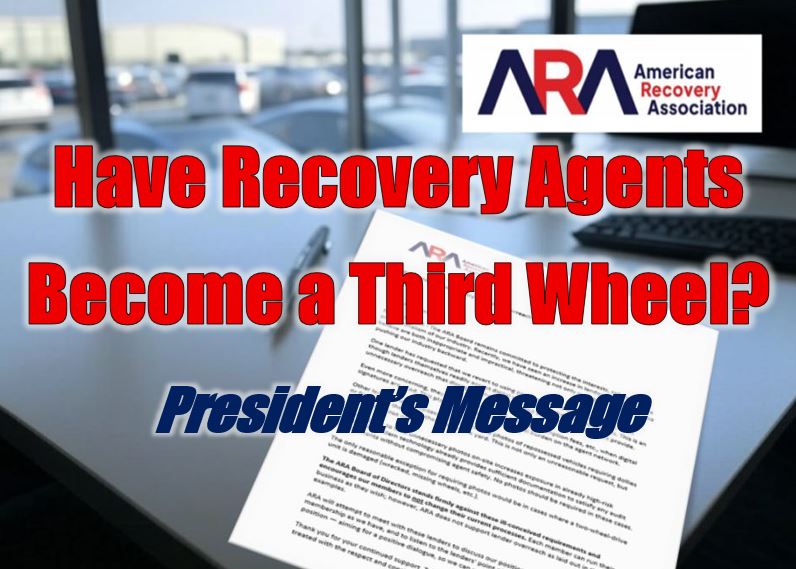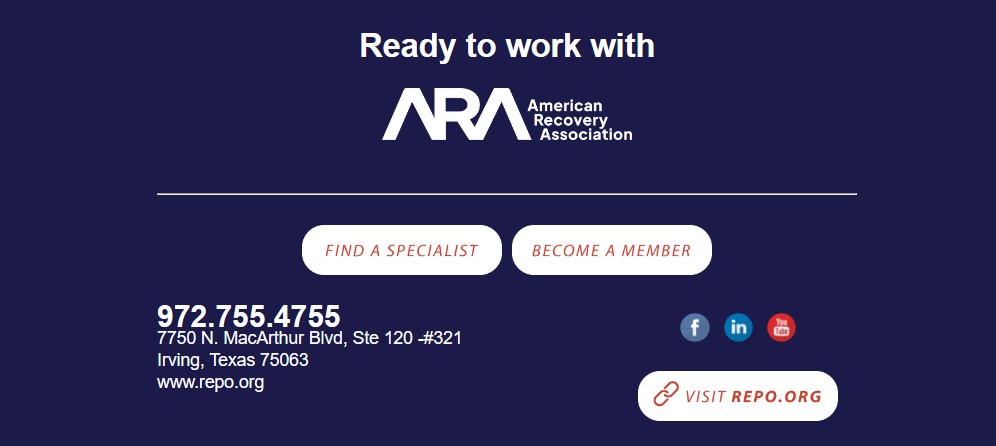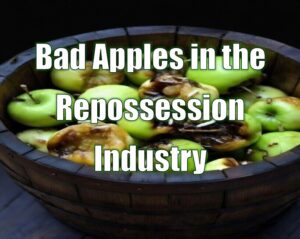As President of the American Recovery Association, I have the privilege of hearing from agents across the country. From those conversations, I am left with great confidence that our industry is more committed to compliance and professionalism than ever. This heightened focus on professional standards uniquely positions us to embody the brands and core values of the lending community we serve. It is no exaggeration to say we are stewards of those well-earned reputations when we interact with borrowers during the most difficult stage of the lending relationship—taking back the collateral.
Despite our professional advancements, trials and travails persist. Increasing repossession litigation. Shrinking margins. Rising insurances costs. The list goes on.
Perhaps the most frustrating of these slings and arrows arises from the three-party ecosystem of the modern repossession industry. I’ll outline my thinking, but the punchline is this: greater transparency is needed to make this ecosystem a livable environment for the agent community.
The Modern Repossession Ecosystem: Lender > Broker-Forwarder > Agent
In the modern repossession era, it is nearly impossible for a new agency to sign directly with a national lender. Even after years of operation, many still cannot break through to direct lender relationships. That is neither good nor bad; it is simply the reality.
Let me be very clear on this point: broker-forwarders, when performing at their optimal potential, introduce substantial value adds to the repossession process in the form of efficiency, uniformity, and technological advantages, to name but a few. No one is advocating for the removal of broker-forwarders from the repossession ecosystem.
But it is equally important to note that the existence of a “go-between”—in any industry or any process—necessarily introduces challenges. A lack of information looms largest in the repossession ecosystem. That issue manifests in several varieties from the agent’s vantagepoint, from the “telephone game” (lender says “A,” forwarder hears “B,” and agent receives “C”); to varying degrees of informational asymmetry; to a complete “black box” on certain critical aspects of the repossession process.
A lack of information breeds frustration, suspicion, and distrust in any relationship.
Boots On The Ground in a Highly-Regulated Environment
Self-help repossession of consumer vehicles is without question the most delicate (and potentially dangerous) function that any service partner performs for the lending community. Lenders, you should be laser-focused on the quality of agent you employ, directly or indirectly, to execute this highly-regulated function. Recovery agents must be your most compliance focused vendor-partners.
That’s an easy thing to say, but maybe a more difficult thing to put into practice. I suspect that cost is a key component of the difficulty. That calls to mind an issue that anyone with young kids (or, in my case, grandkids) can probably relate to: daycare costs. I really do think the analogy fits. Hear me out.
All of the data says that monthly daycare costs now rival (and in some cases even exceed) many young households’ monthly mortgage payment. That’s an incredible thing to think about, especially in an economic climate where consumer goods have become more expensive and consumer budgets are stretched ever thinner.
But of all the household necessities that occupy a line-item on the budget—food, clothing, housing, transportation, phone, and internet—it is difficult to conceive of one more important than the people who are responsible for the health and safety of your children while you are not around. It doesn’t lessen the sting of the cost, but I submit that, in consideration of the very real life-and-death consequences involved, daycare is the service most worthy of higher payment in the modern economy.
And I feel the same way about the agent’s role in the modern consumer lending environment. We are the boots on the ground. We are the stewards of the lender’s reputation in fluid and sometimes dangerous scenarios. We deal with life-and-death scenarios every single day in every single state.
The retail automative industry simply does not work without us and the delicate function we perform. We deserve to be properly compensated for that work on fair terms.
Yet, the lack of information and transparency in the three-party repossession ecosystem leaves many in the agent community feeling like the third wheel. And by that, I mean:
- Continuing the Race to the Bottom: fees and billable costs seem to sink lower each year. Why?
- Erosion of Professional Value: services requiring time, expertise, and liability coverage seemingly are dismissed as worthless add-ons.
- A Threat to Sustainability: small and mid-sized agencies are forced to absorb unreimbursed costs, putting long-term viability at risk.
This needs to be addressed right away.
The “Ask” (or the Punchline)
The value of forwarder-brokers in the repossession ecosystem is not in question. I hope that the lender and the forwarder-broker communities likewise agree that the agents are the backbone of this industry and make the consumer auto lending a viable proposition. I would further hope that it is uncontroversial to say that the high-stakes work repossession agents justifies open and honest conversations about how the lender > forwarder-broker > agent relationship works.
To that end, I invite the lender and forwarder-broker communities alike to sit down and discuss who should be performing which functions; what fees and costs are properly billable to whom and by whom; and what terms the agent community should expect.
In the end, this is about trust. That starts with transparency and communication. I hope we can start there and build trust moving forward.
 — Vaughn Clemmons
— Vaughn Clemmons
President, American Recovery Association












More Stories
Bad Apples in the Repossession Industry
Have You Cast Your Vote?!
Why Self-Help Repossession Is Taken for Granted — and Why Losing It Would Hurt Consumers Most
Resolvion Announces Appointment of Ronald Eubanks as Executive Vice President of Client Strategy
A Necessary Distinction: Financial Oversight vs. Financial Control
TexasARP Is Looking for You!